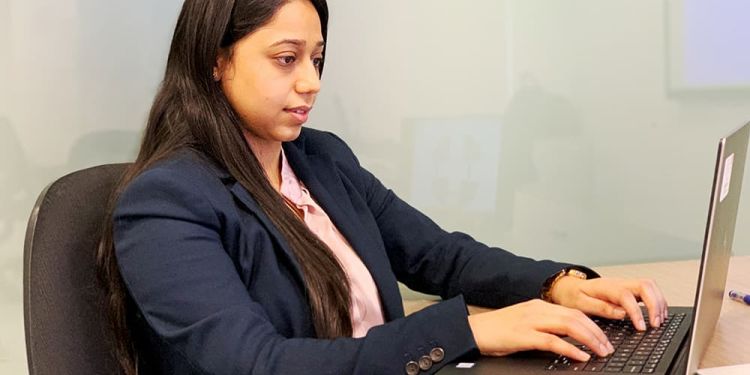“We need an engineer with business acumen,” said my manager at our internal monthly meeting.
The statement surprised me at first. But those words inspired me to become that engineer.
Born in an Orthodox North Indian family, I was an exception. Women aren’t expected to work outside of their home, but I left my town to study petroleum engineering and later work for one of the world’s largest oil and gas service companies. When I reflect on all that I’ve achieved in the last six years, it seems surreal. While there is still a long way to go, I’ve led multiple million-dollar projects for major national and international oil and gas companies, and gained considerable global experience by working with culturally diverse populations.
I was the only woman sitting at the table that day when my manager was looking for a candidate who could navigate the project with both engineering and business skills. He needed someone who could manage not only the technical aspects of the project, but various business segments, such as supply chain, finance, and contracts.
Related: 7 Business Skills Every Engineer Needs
There were two things that intimidated me that day: My background was in engineering and I didn’t have much business acumen. What made me more apprehensive, however, was being a woman in a male-dominated industry and wondering whether I could take on this challenging role.
Being an Engineer Wasn’t Enough
As an engineer, I lacked the business fluency to articulate technical topics and effectively communicate with a broader audience. I had helped solve organizational problems from a technical perspective, but wanted to know how my contributions impacted the business on a larger scale, as well as understand how creative business solutions and processes spark disruption. Seeing things solely through a technical lens wasn’t enough; I wanted to bridge the divide. I was certain Harvard Business School Online’s Credential of Readiness (CORe) program would help me fill these, and many more, gaps.
Gaining a Competitive Edge in a Male-Dominated Industry
Being a woman in a male-dominated industry comes with its own challenges. There are myriad of times in my career when it was difficult to prove my technical credibility to my male peers. Women are often measured by a different yardstick and, if you don’t define yourself, it’s likely you’ll be quickly and inaccurately defined by others.
Throughout my career, I’ve tried to avoid being passive. I’ve continued to learn, try new job roles, or take on additional responsibilities to make myself more visible. Very early in life, I realized that growing and evolving is not finite, it’s perpetual. One’s job doesn’t end after attaining that much-aspired position or job role. There’s always room to evolve and advance. Up until now, I was a technically proficient engineer with minimal business skills. I signed up for CORe with the goal of expanding my understanding of business fundamentals and becoming that well-rounded engineer my boss wanted.
How CORe Helped Me
CORe consists of three courses: Business Analytics, Financial Accounting, and Economics for Managers. All the concepts were taught using the case method, which puts you in the shoes of a protagonist, or business leader. The modules feature Cold Calls, in which participants are randomly selected and asked to provide their insight or solutions to a particular problem. These time-restrictive Cold Calls helped me learn how to make quick, prudent decisions—which is much-needed in the fast-paced oil and gas industry.

The case method is not a spectator sport. It requires active engagement, and is an insightful way of understanding concepts. You’re presented with real-world problems and need to provide practical solutions.
Business Analytics acquainted me with various data analysis and forecasting tools. I implemented these crucial skills to optimize our company’s resources and save time and money on my new project. It also helped me create significant value for a client by introducing a new business model that increased oil and gas production from brownfields at a reduced cost.
Financial Accounting focused on understanding credits, debits, accruals, deferrals, and financial statements. Learning financial accounting helped me decipher the balance sheet and quarterly profit and loss statements of my assigned project and make more informed decisions that reduced its overall operational cost.
In the oil industry, almost every decision is a multi-million dollar one, which directly or indirectly affects the world’s economy. Cost reduction is the most vital endeavor, especially in the current scenario of crude oil price dropping. Financial Accounting helped me find creative and effective ways to maximize the economic recovery of my project.
Economics for Managers allowed me to better understand the contractual pricing of the project’s operational services and identify the key factors that can influence clients’ willingness to pay for a service—a factor I used to overlook. It also helped me fine-tune my understanding of the client perspective and enabled me to make better decisions while dealing daily with clients.
Why You Should Take CORe
CORe can truly transform the arch of your career. The program is a series of interrelated experiences that equipped me with business basics and helped me identify my strengths, weaknesses, and areas where I have to lean in on others. It’s encouraged me to collaborate with my peers and instilled the humility to learn from others’ perspectives. CORe has made a lasting impact and made me fluent in business. It's also given me the confidence to enroll in a full-time MBA program in the future, so that I can dive deeper into the business world.
Now I have technical and business skills, which are crucial in furthering my career. I have gained a competitive edge as CORe equipped me with the necessary skills to successfully execute the aspired project. I’m now confident I can take on more challenging roles in the future.
Are you interested in learning more about CORe? Visit the CORe page to explore how the program could advance your career.




